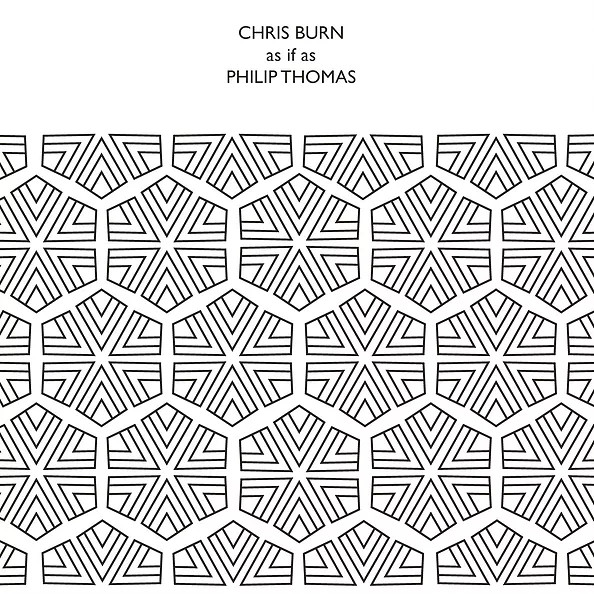Music for solo piano by English composer and improviser Chris Burn. Including premiere recordings of most pieces, and, as well as major original compositions, Burn’s set of six Derek Bailey transcriptions ‘from ten, two and three’, and music for two piano featuring the pianist Kate Ledger.
as if as
only the snow
from ten, two and three
pressings and screenings
the sky a silver dissonance (feat. Kate Ledger)
Transcribing Derek Bailey guitar improvisations for solo pianist might seem like a uniquely pointless exercise, one that rubs against the grain of everything Bailey preached about the liquidity of improvised music; sounds that exist in, and for, the moment only. But as pianist Philip Thomas points out in his sleeve note, Chris Burn’s transcriptions of material from Bailey’s 1991 Solo Guitar Volume 2 give an objectified analysis of the guitarist’s practice and aesthetic. Burn developed these piano transcriptions out of an earlier version he made for the improv trio Cranc, and the ‘stringiness’ of that group’s violin, cello, harp line-up has bled through into his piano rethink; Thomas, you fancy, is plucking the keyboard rather than attacking it with his fingers. The most radical departure from Bailey is due to the piano’s fixed tuning and temperament: some of those perfect fifths and open thirds, sheathed in overtones and resonant sustain on the guitar, sound dangerously naked on the cleaner-cut piano. As a consequence, light shines on the architectural clarity underlining Bailey’s improvisations, and you’re sent back to the original record to discover them anew. Surrounding the Bailey transcriptions is a set of Burn’s own compositions, which reconcile Henry Cowell and John Cage with Cecil Taylor and Muhal Richard Abrams. As If As, Only The Snow, Pressing and Screenings and the two-piano The Sky A Silver Dissonance (for which Thomas is joined by Kate Ledger) are all scampering and elusive – sounds entirely of the piano apparently happy to escape its confines and history.
Philip Clark – JAZZWISE
These pieces are compositions by Chris Burn, except for From Ten, Two and Three, his arrangements of six guitar solos by the late Derek Bailey. Bailey was a doyen and godfather of British free improv and author of Improvisation: Its Nature And Practice In Music, one of the best books on the subject. Bailey’s performances appeared on his 1991 album Solo Guitar Volume 2 (Incus CD 11).
Burn is an accomplished pianist as well as a composer, band-leader, occasional trumpeter and worker with electronics and has I, believe, performed all these pieces but not recorded them. He originally created the arrangements of Bailey’s solos for Cranc, a trio of harp, violin and cello. The experience of hearing those versions performed led Burn to consider how to preserve some of the sound qualities of Cranc’s instrumentation.
The transposition of Bailey’s unique guitar style to piano could be as controversial as performing Bach on a modern grand, but these arrangements work well, adding richer and more mellifluous sonorities. There were even moments when I was reminded of the work of Erik Satie.
Burn’s influences include Henry Cowell and Cecil Taylor, and echoes of both are discernible in some of his original compositions. (There were even a couple of moments during Only The Snow when I thought I detected a Monk chord sequence, but I probably imagined it.)
Some of the pieces test the resilience of the piano to extremes, not to mention Thomas’s stamina. Both pass with honours, though reinforcements in the person of Ledger are called in for the final track.
From passages of pounded chords that make the strings and frame shiver to moments of almost pastoral calm via sparkling cascades of glissandi, Thomas demonstrates a formidable technique in realising these works, but his playing is never just about virtuosity: there is feeling, grace and elegance too, particularly in some of the Bailey transcriptions … rather surprisingly, and I say that with no disrespect to Bailey. A highly impressive recital of riveting compositions.
Barry Withderden – Jazz Journal
In another circumstance we would be here talking about a record of improvisations for piano. But in the case of As If As, what appears to be improvised – at least most of it – is scored. More precisely by Chris Burn, a clever pianist specializing in interpretations of Henry Cowell and John Cage’s works among others, and a multi-instrumentalist composer, arranger and conductor whose activities in the English free music collectivity are well documented. Philip Thomas, himself an outstanding pianist, is the right man to concretely project Burn’s perspective (including a transcription of, get this, extracts from Derek Bailey’s Solo Guitar Vol.2). The grammar of this album may be rather difficult to understand for the newcomer given the large doses of harmonic atypicality and rhythmic fragmentation, yet it is chock full of delights for those who can distinguish between a rational balancing of said and unsaid and random rants replete with purposeless gesticulation. Thomas – aided by Kate Ledger in the final track “The Sky A Silver Dissonance” – lets the music breathe beautifully, translating with rare incisiveness the spaces, velocities, beams and clusters provided by Burn’s writing. In the introductory notes, he emphasizes “the subtleties of the harmonics which are revealed after attacks, but also (…) the silences, the anticipations”. He obviously can’t state that it is thanks to his prowess that these characteristics shine as we, the lucky ones, listen. Such kind of fairness in a virtuoso’s attitude will find favorable ground in this writer’s soul forever. Hopefully, the same will happen to the readers persuaded by the words.
Massimo Ricci – touching extremes
